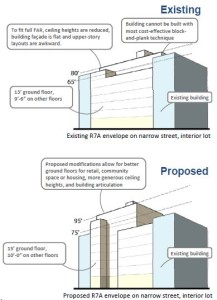
Carl Weisbrod, Chairman of the City Planning Commission. Image credit: CityLand
The program would amend generation-old zoning regulations to encourage construction of efficient mixed-use buildings and affordable senior housing. On September 21, 2015, the City Planning Commission issued a press release revealing two of the major programs to be implemented under Mayor Bill de Blasio’s Housing New York plan. The programs, which are currently making their way through the Uniform Land Use Review Procedure process, are the Mandatory Inclusionary Housing Program and the Zoning for Quality and Affordability Program. The latter proposes zoning text amendments that relax Inclusionary Housing building regulations and parking requirements to enable the construction of high-quality mixed-use buildings that utilize the full amount of buildable residential space and to encourage the construction of a diverse range of affordable senior housing and long-term care facilities.
The City’s elderly population has been growing at an expedited rate, which has caused a spike in the demand for affordable senior housing and accommodations that now exceeds the supply. In response, Mayor de Blasio has proposed to build 5,000 new affordable senior housing units over the next decade. The Zoning for Quality and Affordability program assists in reaching this target by proposing to replace anachronistic zoning text with new regulations that permit the development of a wide range of affordable senior housing and care facilities. The new regulations maintain the 62-year-old age cap qualification for affordable senior housing applicants and add a new income cap of eighty percent of the area median income. Zoning regulations that afford a higher floor area ratio to affordable senior housing in most low- and medium-density zoning districts would be extended to modern zoning districts that did not exist when the current framework was adopted forty years ago.
The outdated zoning regulations currently in place also restrict developers that want to implement green technologies, construct creative exterior building designs, and adhere to other best practices in construction, yet still comply with permitted floor area construction limitations and building envelope regulations. The Zoning for Quality and Affordability program would amend building envelope regulations to enable developers of affordable housing to build high-quality buildings that utilize the maximum floor area space in an aesthetically-pleasing manner. The program would relax zoning regulations for irregularly-shaped sites, increase maximum height limits for residential units and ground floor retail space, and amend unit-density standards in medium- and high-density districts to allow for smaller units to be mixed in with larger units. The program would update building envelope restrictions to allow for a wide variety of building types and courtyard spaces.
Parking requirements increase the cost of constructing affordable housing. Off-street parking construction can cost up to $50,000 per space. Most of these parking spaces, however, remain unused, because most residents of affordable housing—especially affordable senior housing—located in transit-accessible areas do not own a vehicle. The Zoning for Quality and Affordability program would eliminate the parking requirements imposed upon low-income and senior housing developments and provide for other parking requirement reductions to be granted on a discretionary, case-by-case basis to mixed-used developments that contain affordable housing units.
The Department of City Planning has provided Community Profiles to explain the effect individualized affect the Zoning for Quality and Affordability program would have on each community. To see how your community would be impacted, click here.
Every community board in the City will be voting on the Zoning for Quality and Affordability program soon and is required to issue their report by November 30th, 2015. Information about how to speak or submit comments to your community board can be found here.
CPC: Zoning for Quality and Affordability (160049-ZRY) (Sept. 21, 2015).
By: Jessica Soultanian-Braunstein (Jessica is the CityLaw Fellow and a New York Law School Graduate, Class of 2015)


